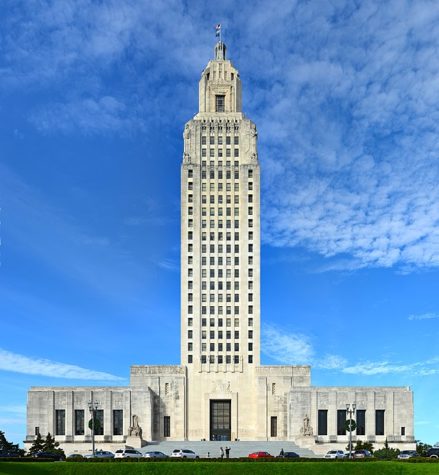
Gov. Jeff Landry signed 11 bills into law on March 5 and eight additional bills on March 6 following the Louisiana Special Legislative Session on Crime.
“Our criminal justice system has lost its balance,” Landry said on Feb. 18, at the start of the session.
The Louisiana State Legislature convened in Baton Rouge from Feb. 19 to 29 after Landry declared a state of emergency due to a police officer shortage.
Legislators discussed over two dozen proposed laws at the special session, including expanding death row execution methods, permitless concealed carry, legal protection for police officers and harsher penalties for certain criminal offenses.
In 2021, Louisiana had one of the highest crime rates in the U.S., making these tough-on-crime policies a pivotal strategy in the new Republican governor’s administration.
“Tough-on-crime laws generally increase incarceration rates,” Stan Oklobdzija, assistant professor of political science at Tulane University, said. “Louisiana is usually either number one or number two when it comes to incarceration rates among U.S. states. None of this incarceration has brought any safety for Louisiana as it remains one of the most dangerous and violent American states.”
House Bill 1, also known as the Truth and Transparency Bill, will allow for the release of some juvenile criminal records on an online portal. The bill also allows prosecutors to charge 17-year olds as adults for all crimes, including offenses ranging from purse snatching to abortion.
“What is going to happen to the economy because their records are exposed? Are we actually setting ourselves up for more crime?” Gary Hoover, the executive director of the Murphy Institute at Tulane, said. The Murphy Institute helps to tackle issues related to political economy and morality.
“What the legislators are doing is threatening [juveniles]. They’re saying ‘if you engage in this activity, your records are going to be exposed. You’re not going to be able to get a job,’” Hoover said. “That will have some impact on the economy and even more people will be disassociated with higher education.”
“When minors are incarcerated with adults, they are more likely to have mental health problems, and we also know that when they come out, they’re more likely to engage in recidivism,” Anita Raj, executive director of the Newcomb Institute, said.
Republicans praised the legislation as a step towards justice for families of violent crime.
“The steps we take to restore that balance may be difficult to accept for some. However, when promises are made to a victim’s family and friends, granting them that justice restores the balance,” Landry said.
House Bill 7 increases the sentencing of carjacking offenders to anywhere from five to 20 years, up from the previous minimum of two to 20 years. Violent carjackings can now be punished by 20 to 30 years of jail time.
“A lot of carjacking is committed by juveniles who have diminished cognitive facilities because their brains aren’t fully developed. As such, they are far less likely to consider potential sentences than an adult,” Oklobdzija said.
House Bill 19 allocates over $19 million to the Louisiana State Police, with $1.75 million designated to the Traffic Enforcement Program and to supplement New Orleans local law enforcement.
“Utilizing police that are not from the community base, like for example, state police, may not have the kind of positive effects that one might hope,” Raj said. “If the police departments have long-term, trusting relationships with the community, there is a humanization of community members by the police officers, but also of the police officers by community members.”
Portions of the funding go toward pay raises for officers and the establishment of a permanent state police presence in New Orleans, Troop NOLA, intended to aid the understaffed New Orleans Police Department.
The money will allow for the operation of the troop for one fiscal year, until June 2025.
The bill also devotes $3 million to Operation Lone Star, a plan to send the Louisiana National Guard to the Texas border in March.
“[Landry] is playing to the bigotries of a voter base that has increasingly embraced ethnonationalism as a mainstream party position,” Oklobdzija said. “The fact that it costs LA taxpayers about $3 million will likely not register with Republican voters in Louisiana.”
Tulane spokesperson Mike Strecker said that the Tulane University Police Department has not been negatively affected by the NOPD shortage which triggered the special legislative session.
“The shortage of NOPD officers has not adversely impacted its ability to ensure that the Tulane campus is safe,” Strecker said. “TUPD officers patrol a one-mile perimeter around the uptown and downtown campuses and handle NOPD calls for service.”
Louisiana’s three-month Regular Legislative Session convened on March 11.


Leave a Comment